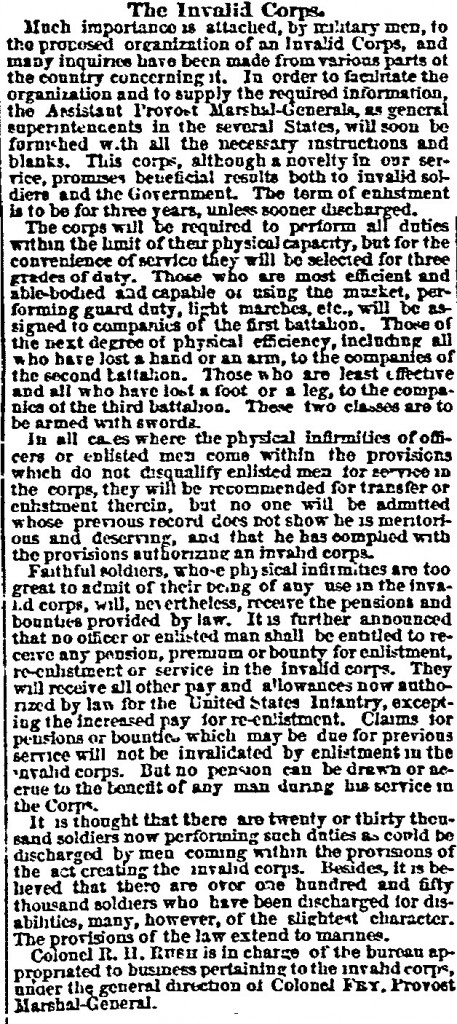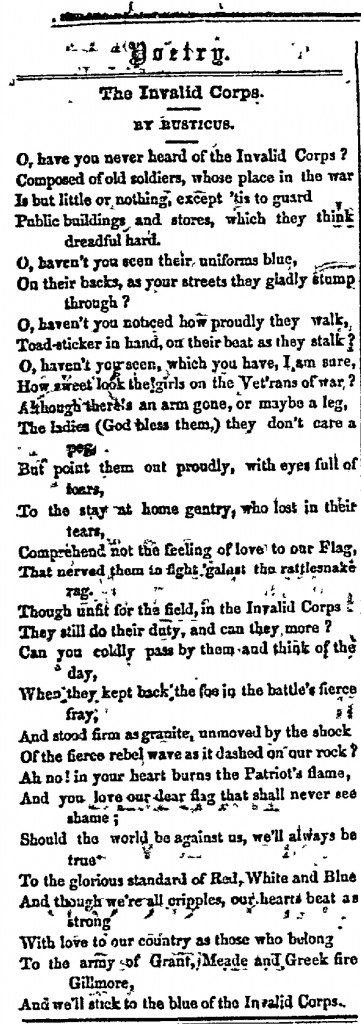The Invalid Corps (or Veteran Reserve Corps)
Posted By Norman Gasbarro on May 6, 2011
The Veteran Reserve Corps (originally the Invalid Corps) was a military reserve organization created within the Union Army during the Civil War to allow partially disabled or infirm soldiers (or former soldiers) to perform light duty, freeing able-bodied soldiers to serve on the front lines.
The Invalid Corps
Much importance is attached, by military men, to the proposed organization of an Invalid Corps, and many inquiries had been made from various parts of the country concerning it. In order to facilitate the organization and supply the required information, the Assistant Provost Marshal-Generals, as general superintendents in the several States, will soon be furnished with all the necessary instructions and blanks. This corps, though a novelty in our service, promises beneficial results both to invalid soldiers and the Government. The term of enlistment is to be for three years, unless sooner discharged.
The corps will be required to perform all duties within the limit of their physical capacity, but for the convenience of service they will be selected for three grades of duty. Those who are most efficient and able-bodied and capable of using the musket, performing guard duty, light marches, etc., will be assigned to companies of the first battalion. Those of the next degree of physical efficiency, including all who have lost a hand or an arm, to the companies of the second battalion. Those who are least effective and all who have lost a foot or a leg, to the companies of the third battalion. These two classes are to be armed with swords.
In all cases where the physical infirmities of officers or enlisted men come within the provisions which do not disqualify enlisted men for service within the corps, they will be recommended for transfer or enlistment therein, but no one will be admitted whose previous record does not show he is meritorious and deserving, and that he has complied with the provisions authorizing an invalid corps.
Faithful soldiers whose physical infirmities are too great to admit of their being of any use in the invalid corps, will, nevertheless receive the pension and bounties provided by law. It is further announced that no officer or enlisted man shall be entitled to receive any pension, premium or bounty for enlistment, re-enlistment or service in the invalid corps. They will receive all other pay and allowances now authorized by law for the United States Infantry, excepting the increased pay for re-enlistment. Claims for pensions or bounties, which may be due for previous service will not be invalidated by enlistment in the invalid corps. But no pension can be drawn or accrue to the benefit of any man during his service in the Corps.
It is thought that there are twenty or thirty thousand now performing such duties as could be discharged by men coming within the provisions of the act creating the invalid corps. Besides, it is believed that there are over one hundred and fifty thousand soldiers who have been discharged for disabilities, many, however of the slightest character. The provisions of the law extend to marines.
Colonel R. H. Rush is in charge of the bureau appropriated to business pertaining to the invalid corps, under the general direction of Colonel Fry, Provost Marshal-General.
The Invalid Corps
By Justicus
O, have you never heard of the Invalid Corps? Composed of old soldiers, whose place in the war is but little or nothing, except ‘tis to guard public buildings and stores, which they think dreadful hard.
O, haven’t you seen their uniform blue, on their backs, as your streets they gladly stump through? O, haven’t you noticed how proudly they walk, toad-sticker in hand, on their boat as they stalk?
O, haven’t you seen, which you have, I’m sure, how sweet look the girls on the Vet’rans of war?
Although there’s an arm gone, or maybe a leg, the ladies (God bless them) they don[t care a peg.
But point them out proudly, with eyes full of foars, to the stay at home gentry, who lost in their tears, comprehend not the felling of love to our Flag.
Though unfit for the field, in the Invalid Corps they still do their duty, and can they more?
Can you coldly pass them and think of the day, when they kept back the foe in the battle’s fierce fray, and stood firm as granite, unmoved by the shock of the fierce rebel wave as it dashed on our rock?
Ah no! in your heart burns the Patriot’s flame, and you love our dear flag that shall never see shame; should the world be against us we’ll always be true to the glorious standard of Red, White and Blue.
And though we’re all cripples, our hears beat as strong with love to our country as those who belong to the army of Grant, Meade and Greek fire Gillmore, and we’ll stick to the blue of the Invalid Corps.
In addition to the above poem, the following song was found “glorifying” or poking fun at the Invalid Corps:
-
I wanted much to go to war,
-
And went to be examined;
-
The surgeon looked me o’er and o’er,
-
My back and chest he hammered.
-
Said he, You’re not the man for me,
-
Your lungs are much affected,
-
And likewise both your eyes are cock’d,
-
And otherwise defected.
-
Chorus:
-
So, now I’m with the invalids,
-
And cannot go and fight, sir!
-
The doctor told me so, you know,
-
Of course it must be right, sir!
Many men from the Lykens Valley area transferred to or enlisted in the Veteran Reserve Corps as the Invalid Corps came to be known. They performed light duty until their discharge and most served admirably through the end of the war. Those who were eligible for pensions began collecting them following their service.
News clippings are from the on-line resources of the Free Library of Philadelphia.
 ;
;




Hi, I was looking at my great grandfather’s pension records online. It has “Army Invalid”. Would you know if there are records of his injuries that I can look at online?
This is his military record information:
Marcus S Tyler, 18, enlisted as a private in the Union Army in Lockport, NY. He enlisted in NY’s M Co. 13th Heavy Artillery Regiment and mustered out of Norfolk, VA on 28 June 1865. Source: New York: Report of the Adjutant-General.